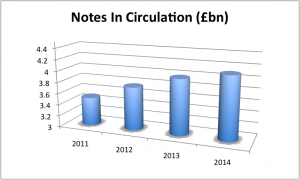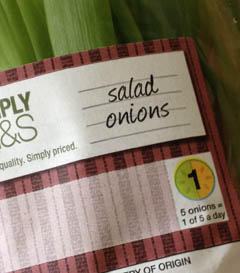Are there more Scottish banknotes in circulation in the run-up to the independence vote?
 As someone regularly engaged in a spot of missionary work north of the border I’m well used to the odd Scots’ fiver or tenner passing through my wallet.
As someone regularly engaged in a spot of missionary work north of the border I’m well used to the odd Scots’ fiver or tenner passing through my wallet.
Most Brits are aware that Scotland (and for that matter Northern Ireland and on a subtly different legal basis Gibraltar) have their own banknotes. Even those who have never travelled to the outskirts of the Union will have been landed with one at some point in their lives and been greeted with grumbles and rolling eyes (or even flat refusals) when trying to pass them to a tradesman or shopkeeper outside of their country of origin.
Fortunately I visit Scotland often enough to avoid this particular “sport” (and, both knowing and loving the Scots’ sense of humour, I wonder if it’s the only reason they print them in the first place). I visit Scotland often enough to be able to hold onto them ’til the next time I’m up there.
I also visit Scotland often enough to notice a change in those ethnic fivers and tenners recently.
There seem to be an awful lot more of them.
Historical facts
According to the Committee of Scottish Bankers the first Scottish bank to issue banknotes was The Bank of Scotland in 1695. According to the Bank of England’s latest Scottish and Northern Ireland Banknote Issuance report they have been regulated by the British Government since 1845 and have been under the purview of the Bank of England since The Banking Act of 2009. Currently there are three Scottish commercial banks who print their own banknotes – The Bank of Scotland, The Royal Bank of Scotland and Clydesdale bank – and current legislation allows them to do so on the condition that they hold sufficient assets to back their issue.
Of particular note to the conspiracy theorists amongst us is that the issue of Scottish banknotes is not within the power of the devolved Scottish assembly, nor for that matter the British government, it’s entirely down to the commercial banks themselves. This perhaps partly accounts for the anomaly that, whilst they are legal Sterling currency they are not legal tender – not even in Scotland where no currency technically enjoys the status of legal tender; their acceptance is entirely at the discretion of whomsoever one is trying to pass them to.
Statistical facts
The Committee of Scottish Bankers website states that “The majority of banknotes circulating in Scotland are issued by the Scottish banks.” It is therefore not surprising that I’m well used to a regular stream of these fivers and tenners passing through my hands when exchanging a crisp English twenty pound note for a Starbucks or a takeaway when I’m up that way. Of late though I seem to be getting back Scottish banknotes almost exclusively and, with the independence referendum just round the corner, that this particular symbol of nationhood seems more prevalent has my spidey-sense tingling more than somewhat.

And the Bank of England’s regulatory reports, available online for the last four years, seem to suggest my suspicions may not be entirely groundless. In the three years between June 2011 and June 2014 when these reports are issued, there has been around an 18% increase in Scottish banknotes in circulation, from approximately £3.5bn to the current £4.1bn.
This is hardly a smoking gun of course, but that’s still well ahead of price inflation or GDP. And bearing in mind that they are printed by commercial banks rather than the government – hardly a flourishing sector at the moment – and that they must be backed by assets in order to be printed, that increase does seem something of an, er, achievement to me.
And while the Scottish Nationalist majority in the Scottish Assembly might not have direct control over their printing (at least not yet!) that doesn’t mean a little soft-power isn’t being wielded somewhere.
If I were a Scotsman…
On September 18th 2014 Scotland will vote on independence from the United Kingdom and, without wishing to appear dismissive, as an Englishman I don’t really care much which way the vote goes. I mean, for me, what really changes? It’s not like Sultan Salmond will be sawing Scotland off at Carlisle and towing it away the minute he’s freed from the imperial yoke. Scotland belongs to the Scots; if they vote for independence then the best of luck to them and if they vote to stick with the UK, hey, that’s just great too.
If I were a Scotsman I’d be sorely tempted by the idea of independence. As a man who has been self-employed for most of his life the notion of going it alone and doing better for yourself is deeply ingrained in me. Yet, and in spite of that, I would most certainly vote to stick with the Union.
And therein perhaps lies the most pragmatic and overarching argument for sticking with the Union. Independence means two smaller administrations and the law of economies of scale states that the sum of those parts will be greater than the current whole. We’ll all end up paying more money for more politicians and more civil servants.
At least under the current system the Scots and the rest of the Brits are sharing the cost of a smaller pool of these bozos.
 I don’t pay much attention when I’m out shopping. I just see the stuff I want and throw it in my basket once I’ve pushed my way through the loitering mass of picky package-squeezers who seem to feel the need to man-handle (or more accurately in this case woman-handle) everything on the shelf before selecting which to take.
I don’t pay much attention when I’m out shopping. I just see the stuff I want and throw it in my basket once I’ve pushed my way through the loitering mass of picky package-squeezers who seem to feel the need to man-handle (or more accurately in this case woman-handle) everything on the shelf before selecting which to take.